A return to the Suffolk Coast
On 17th May 2021 people in England were finally able to stay away from home in a hotel or bed & breakfast accommodation after lockdown restrictions were eased. This was a wonderful relief for many people as they could finally spend some time away with family and friends without being limited to self-catering and eating out of doors.
It was a coincidence that we had booked a few days away with friends at a favourite B&B the exact same week that the restrictions eased. We had booked this before the lockdown easing dates were announced, just a lucky guess!
Sally & Rosie at Trustans Barn gave us a warm welcome and showed us to our breakfast tent and rooms. Covid-19 safety measures still in place (not everyone has been vaccinated), we took our breakfast outdoors in the tents, apart from the last morning when high winds battered the canvas and it was safer to retreat indoors.
It is lovely to revisit old favourites and Minsmere could not be missed, but we also managed to see places that are not as widely known, which have fewer visitors - hidden Suffolk in a way.
First was the village (or what's left of it) of Covehithe, a few miles north of Southwold. The village is on the coast and coastal erosion is rapidly claiming the land. Thin spits of beach lie between wetland reed beds and the sea, and the surrounding cliffs have collapsed tipping trees onto the beach. The beach itself is a glorious golden sand and is quite unusual being dotted with the remains of these trees.
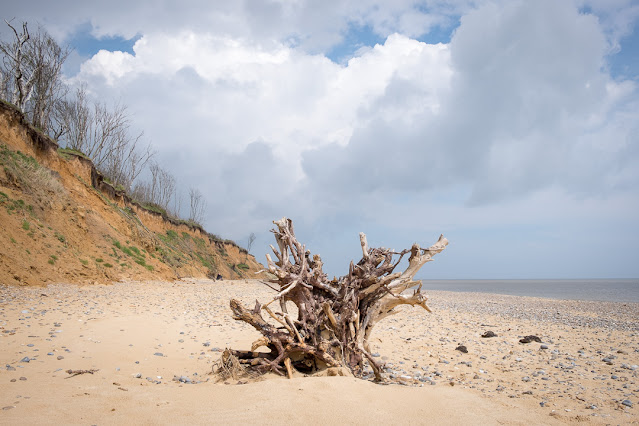 |
| Uprooted trees on the beach |
 |
| Patterns of tree branches in the sand |
The beach is only accessible by footpath, a limited number of cars can be parked outside the 'church within a church' of St Andrews. The original church ruins are much larger than the newer, thatched church which sits inside the ruins and itself dates back to the 1600s.
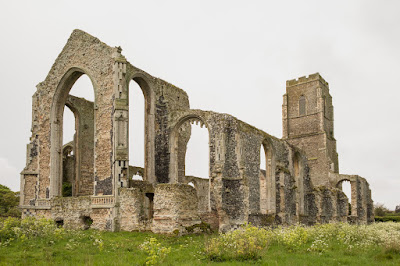 |
| St Andrews Church |
If you visit the church look closely at the windows of the inner church and you can see graffiti dating from the 1800s.
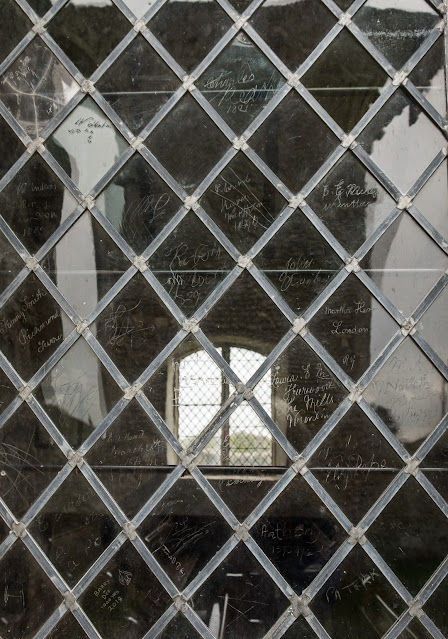 |
| Ancient graffiti |
The reed beds of Benacre national nature reserve are located at Covehithe just behind the beach and they are home to avocets, swans, ducks, oystercatchers and plovers amongst other birds. Over 100 breeding bird species use the reserve.
 |
| Oystercatchers and a duck |
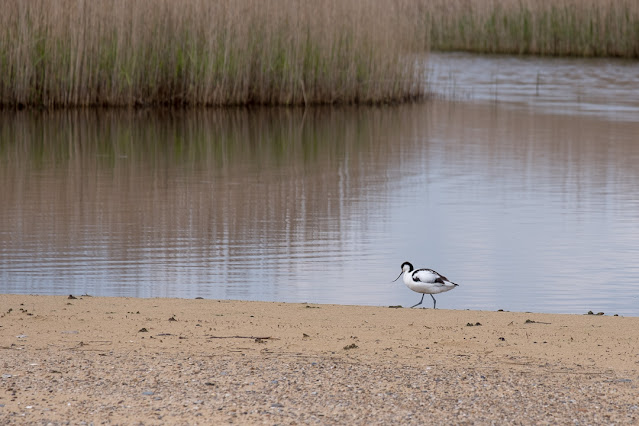 |
| Avocet on the beach |
At one part of the beach there are more fallen trees, some still clinging to the cliff at crazy angles. Take a footpath behind the sand into the woodlands on top of the cliffs and you will see the most incredible display of bluebells in mid May.
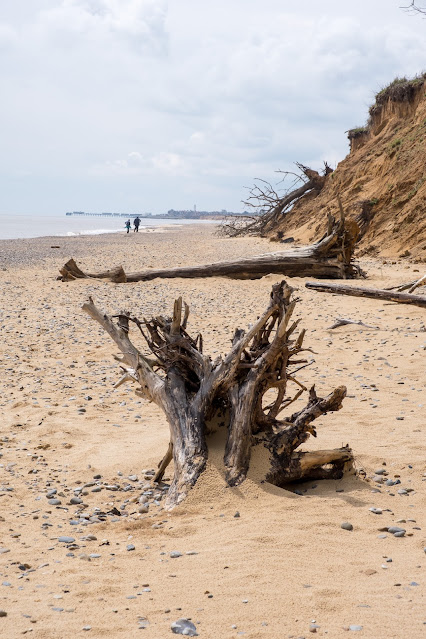 |
Coastal erosion at Covehithe
|
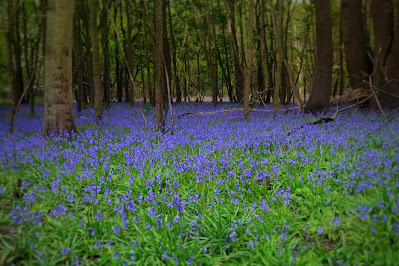 |
| Bluebell woods above the beach |
On earlier trips to Suffolk I didn't get the chance to take to Walberswick ferry to Southwold, but this time the ferry was running and it was a real joy being rowed across the River Blyth by Dani Church who is the 5th generation of her family to run the ferry. Incredibly, the ferry has been running since the year 1236. The ferry normally runs between Easter and November from 10am - 5pm and costs just £2 per adult!
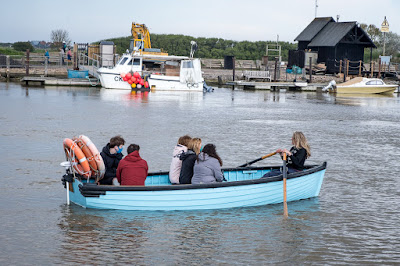 |
| The Walberswick Ferry |
Another hidden delight, especially for artistic souls, was a visit to Bawdsey Quay and beach. There are lots of rusty pieces of ironwork edging the shingle beach, sea kale sprouting in clumps in the pebbles and crowds of wooden groynes leading into the sea.
 |
| Ironwork at the edge of Bawdsey beach |
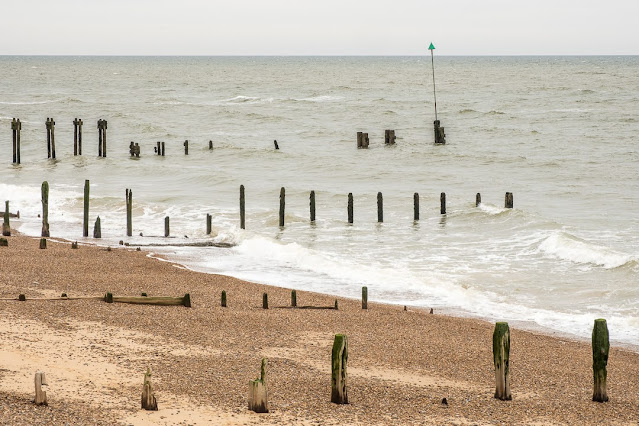 |
A multitude of groynes
|
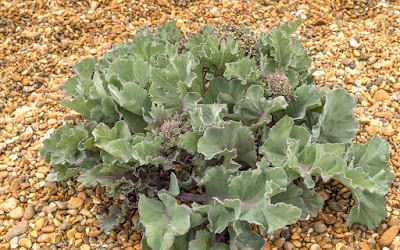 |
| Sea kale on the beach |
No visit to this part of Suffolk is complete without popping into Minsmere RSPB Reserve to see the bird life around the reed beds. On this occasion we saw plenty of avocets and black headed gulls and witnessed what must have been the courting behaviour of a pair of redshanks. It was quite comical watching the male bobbing up and down and stamping his feet to attract the attention of the female. She was completely ignoring him as he got more and more agitated, finally flying short 'jumps' in the air behind her.
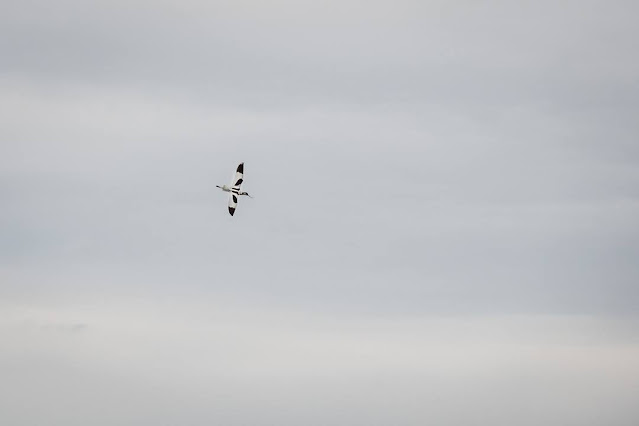 |
| Avocet in flight |
 |
| Avocet |
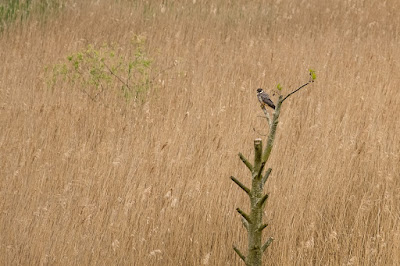 |
Hobby
|
 |
| Black headed gull |
 |
| Redshanks courting rituals |
Sally and Rosie told us about a new sculpture on the beach at Thorpeness, it is a traditional cairn made with coralline crag stones collected from the beach during stormy weather and is located in the inter-tidal zone and so will eventually be reclaimed by the sea. Local artist, Henry Fletcher collected the stones and built the cairn. These stones are from an underground seam formed about 2.5 millions years ago and are unique to the Norfolk /Suffolk area. The stones are a beautiful golden colour and are studded with fossils.
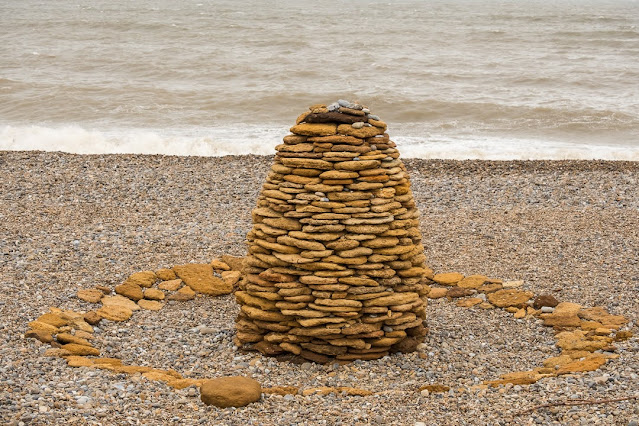 |
| The Coralline Cairn on Thorpeness beach |
 |
| Fossils in the coralline crag stone |
On the way back to the car we came across Mabel & Co, an independent design studio printer and stationer selling lovely old fashioned stationery using traditional printing methods. There was quite a bit of nostalgia felt as we looked at all their beautiful simply styled notecards, cardboard boxes and stationery. We even managed to buy some new blades for an old pencil sharpener!
 |
| Mabel & Co, Thorpeness |
 |
| Old printing press, still in use at Mabel & Co |
We left Suffolk with new memories and jars of delicious honey from the Trustans Barn bees.
 |
| Trustans Barn honeycomb |
To find out more about the area and recommendations of places to go take a look at my other blog posts on Suffolk:
























Comments
Post a Comment